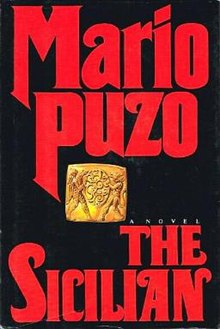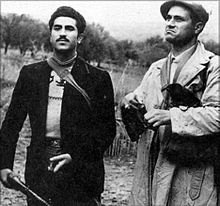Type a search term to find related articles by LIMS subject matter experts gathered from the most trusted and dynamic collaboration tools in the laboratory informatics industry.
 U.S. first edition cover | |
| Author | Mario Puzo |
|---|---|
| Language | English |
| Series | The Godfather |
| Genre | Thriller, crime fiction |
| Publisher | Random House |
Publication date | November 1984 |
| Publication place | United States |
| Media type | Print (hardback and paperback), Audiobook |
| Pages | 416 pp. (hardback edition) and 410 pp. (paperback edition) |
| ISBN | 0-671-43564-7 (hardback edition) and ISBN 0-345-44170-2 (paperback edition) |
| OCLC | 11030814 |
| 813/.54 19 | |
| LC Class | PS3566.U9 S5 1984 |
| Preceded by | The Godfather |
The Sicilian is a novel by American author Mario Puzo. Published in 1984 by Random House Publishing Group (ISBN 0-671-43564-7), it is based on the life of Sicilian bandit Salvatore Giuliano. It is set in the same universe as Puzo's most famous work, The Godfather (1969), and contains characters from The Godfather.[1] It is regarded as The Godfather's literary sequel and is the second book in The Godfather novel series. It was adapted into a film in 1987, though all Godfather references were removed for copyright reasons in the film adaptation.
In this novel, the spelling of Salvatore Giuliano's name was intentionally changed by Puzo to "Guiliano". This novel, though a work of fiction, is based on the real-life exploits of Giuliano.
In 1950, Michael Corleone, the son of Sicilian-American Mafia Don Vito Corleone, is preparing to return home to America after his exile in Sicily. He meets with Don Croce Malo, the most powerful Sicilian Mafia boss. Don Croce and Michael's father have allied to help the famous bandit Salvatore "Turi" Giuliano escape Sicily and go with Michael to America. Michael learns of a set of documents Giuliano has that would cause the downfall of the current Italian government, to be released upon Giuliano's death or capture, called the Testament. Michael also meets Giuliano's parents and Gaspare "Aspanu" Pisciotta, Giuliano's best friend and second in command.
In 1943, Turi Giuliano and Aspanu Pisciotta are stopped by the Carabinieri, the corrupt Italian police, while smuggling food, but they refuse to give up the food or the name of who they were trading with. Giuliano is shot, but he manages to kill his attacker, a police Sergeant. Turi is carried by Aspanu to a local monastery, where he recovers from his wounds and learns more about the criminal side of Sicily under the care of the Abbot Manfredi. After he recovers, he and Aspanu make their way back to Giuliano's home in Montelepre, where he is still being sought for the murder. While discussing his future with family and friends, the local police attempt to arrest Turi. Turi and Aspanu open fire on the trucks pursuing them and kill some policemen. They flee to the mountains. Innocent citizens of Montelepre are arrested in retaliation.
Turi and Aspanu are met by Turi's godfather, Hector Adonis, who fails to dissuade them from becoming bandits. Turi and Aspanu decide to free the prisoners and break into the local police barracks where they are being held. Turi narrowly escapes death at the hands of the Corporal Canio Silvestro whose pistol fails when he pulls the trigger at Turi's head. The freed prisoners include local bandits Passatempo and Terranova, who join Turi's band. Giuliano begins to become famous throughout Italy after a high-profile robbery, and he becomes a hero in Sicily, as he gives away much of his band's earnings to the poor. Silvestro, disgraced after being spared by Giuliano, asks to join his band. They test his loyalty by asking him to execute Frisella, a barber who informed on Giuliano. Silvestro does so and they attach a note to his body saying "So die all who betray Giuliano".
Giuliano comes to dominate the entire northwest corner of Sicily. Giuliano orchestrates a kidnapping of a Sicilian nobleman, Prince Ollorto. Ollorto's ransom is arranged by Don Croce, who Ollorto had been paying protection money to. The kidnapping causes Giuliano to come into direct conflict with Don Croce and the Mafia for the first time. Don Croce allows Giuliano to be assassinated by the other Dons, but Giuliano manages to avoid them all. Don Croce finally sends assassin Stefan Andolini, a cousin of Don Corleone's, whose life is only spared by Giuliano due to the intervention of the Abbot Manfredi, his father. Andolini joins Giuliano's band and acts as an emissary between Giuliano and Don Croce.
In 1950 Trapani, Michael Corleone is joined by Peter Clemenza, a capo of Don Corleone's, who is helping with the escape. Michael meets Justina, Turi's pregnant wife, and Hector Adonis. She leaves for America. Adonis informs Michael that the Testament is hidden in a gift Giuliano's mother gave him and Michael sends it to his father in America.
In 1947, Don Croce is aligned with the ruling Christian Democratic party, mostly to deny power to the Socialist parties that he believes could destroy the Mafia. Don Croce, along with Italy's Minister of Justice Franco Trezza, draw up plans to mount an offensive against Giuliano, but instead give foreknowledge of the plans to Giuliano in return for his help in swinging the upcoming election for the Christian Democrats. Giuliano accepts these terms, along with a promise of a pardon, and helps the campaign using propaganda and intimidation.
A Socialist parade celebrating recent victories over the Christian Democrats takes place in the towns of Piani dei Greci and San Giuseppe Jato and converge at a plain called the Portella della Ginestra. Giuliano agreed to suppress the parade, giving his two chiefs, Passatempo and Terranova, orders to "shoot over their heads" to get the crowds to disperse. The men end up shooting too low, and massacre many people, including women and children. The massacre proves devastating for Giuliano's image in Sicily and destroys any hope of a pardon. Giuliano discovers that Passatempo had been paid off by Don Croce to shoot the paraders and Giuliano executes him. He also executes six Mafia chiefs who were defending the estate of Prince Ollorto from land claims by the local peasants.
A large force in Sicily assembles under the command of Colonel Luca to take down Giuliano. Giuliano's parents and many citizens of Montelepre are arrested for conspiring with him. In retaliation, Giuliano robs a heavily guarded truck that held the money for paying the Carabinieri. Colonel Luca then calls for the rest of the reserve force to come in. Giuliano's band is falling apart, with Silvestro escaping to England and Andolini and Terranova being killed by police. With Colonel Luca's forces closing in and Don Croce having betrayed him, Giuliano knows he must leave for America or die in Sicily.
Aspanu Pisciotta meets with Michael and tells him where to meet Giuliano. The next day, Clemenza and Michael are heading to the meeting place when they hear that Giuliano has been killed by the Carabinieri. They are arrested by Inspector Velardi, but are released soon after due to the intervention of Don Croce. Michael and Clemenza find out that, having grown increasingly paranoid and resentful of Giuliano, Pisciotta has betrayed Giuliano to Don Croce. Pisciotta had shot and killed Giuliano in a moment of panic, fearing that Giuliano knew of his betrayal. Later, imprisoned for banditry, Pisciotta is poisoned by Hector Adonis with the help of Don Croce. Adonis leaves a note in Pisciotta's pocket reading, "So die all who betray Giuliano". With Giuliano dead, Don Croce and the Mafia enrich themselves more than ever at the expense of the people of Sicily.
Michael returns home to Long Island. Don Corleone tells him that they will not release Giuliano's Testament, under the deal he made with Don Croce to ensure Michael's safety. Michael, shocked, realizes that he had been unknowingly working against Giuliano, and that giving the Testament to his father had allowed Giuliano to be killed. Don Corleone teaches Michael a rather dubious lesson: it is better to remain alive at whatever costs than to be a dead hero.
The principal characters that drive the plot of the story, many of whom are based on real-life figures.

In 1987, The Sicilian was adapted into a film, directed by Michael Cimino and starring Christopher Lambert as Salvatore Guiliano.[2] Due to rights issues, all Godfather references were removed and the characters of Michael Corleone and Peter Clemenza were not included in the film adaptation.